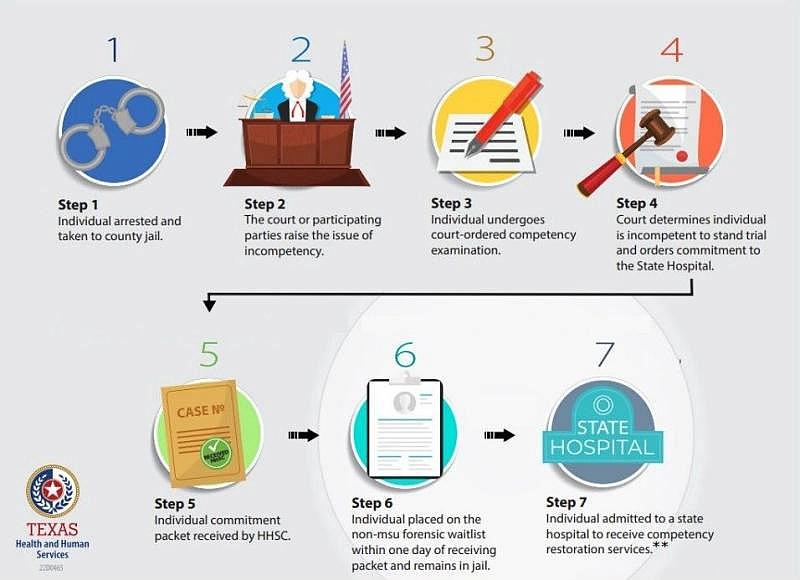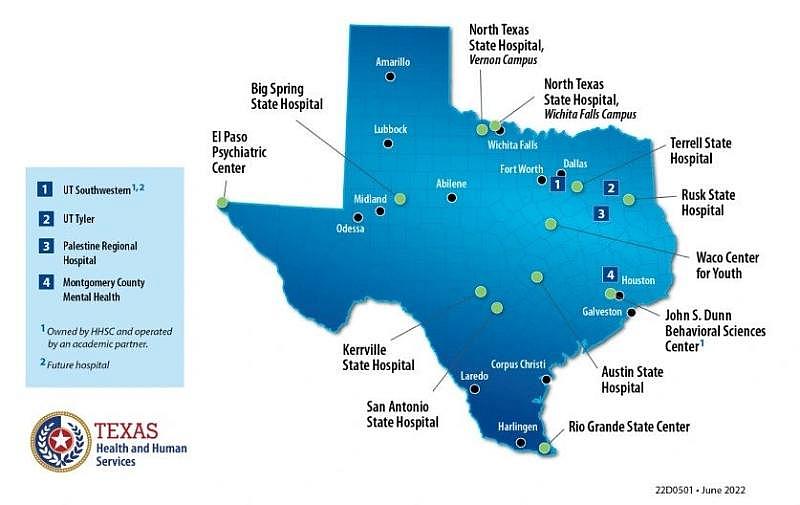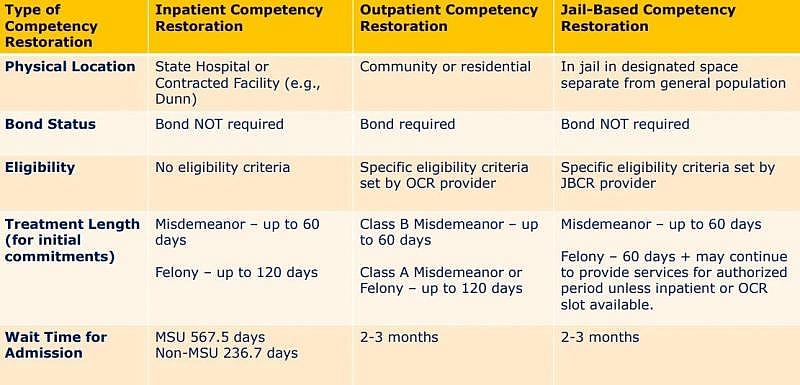Despite waitlist record, leaders keep pushing ‘Eliminate the Wait’ plan for state hospitals
This project was produced as a project for the USC Center for Health Journalism's 2021 National Fellowship.
Other stories by David Barer and Josh Hinkle include:
Mental competency consequences: the hidden, unreliable data Texas tracks… or doesn’t
Wrong races, hidden names among data challenges our team faced with jail mental health project
Austin court’s redirection of those committing low-level crimes could be saving taxpayer money
Mental Competency Consequences: The Hidden and Unreliable Data Texas Tracks — Or Doesn't
State of Texas: Leaders consider ‘consequences’ of not tracking state hospital waitlist data
‘Horrifying’ wait times for state hospital beds, official says
A state hospital death in restraints and seclusion: What happened to Justin Reeder?
Jail waitlist for mental health help hits new record. This plan proposes a statewide fix.
State mental hospital backlog grows, new record exceeds 2,500 waiting in jail
Thousands waiting in jail for state hospital beds, is help coming?
AUSTIN (KXAN) — As the waitlist for a state hospital bed in Texas continues to grow, mental health leaders remain dedicated to the widespread adoption of a strategy known as “Eliminate the Wait.” KXAN first reported on this approach to reduce pressure on the waitlist in 2021 — a partnership between the state’s Judicial Commission on Mental Health and the Health and Human Services Commission.
“Over the past year, we’ve brought training, technical assistance to law enforcement, jail administrators, courts and counties,” HHSC’s state forensic director, Dr.
Dr. Jennie Simpson, Texas Health and Human Services Commission State Forensic Director, speaks at a regional forum on inpatient restoration for mental competency. (Courtesy: Texas Judicial Commission on Mental Health)
Jennie Simpson, said Thursday in Austin, updating a crowd attending a regional forum on the issue.
JCMH and HHSC — along with the Hogg Foundation for Mental Health, Sheriffs’ Association of Texas, Texas Police Chiefs Association and Texas Council of Community Centers — hosted the forum. Among its goals:
- Share national, state and local best practices.
- Provide stakeholder-specific training to law enforcement, behavioral health providers, court officials and jail staff.
- Support county leadership in reviewing waitlist data, discussing the local competency restoration process, and developing an action plan and task force for change.
“There are a significant number of people who are better served with treatment in connection to the support and services that address the factors that put them at risk of justice involvement,” Simpson added.
Competency restoration process. (Courtesy: Texas Health and Human Services Commission)
Growing waitlist backlog
The main component in the “Eliminate the Wait” plan has been a toolkit that identifies root causes of the ballooning waitlist and provides checklists for different mental health and criminal justice officials with a hand in the restoration process. People found mentally incompetent to stand trial most often receive restoration treatment in a state hospital before they can actively participate in their own defense.
Plan organizers have previously cited a 38% increase in the number of people found incompetent to stand trial in Texas over the past two decades. In September 2021 — around the time the plan was unveiled to the public and potential stakeholders — 1,766 people were waiting in jail for a state hospital bed, according to HHSC data.
One year later, KXAN reported that number had reached a record 2,540. The average wait time for a maximum-security bed was 699 days at that point — also a record, according to HHSC data.
State officials have largely blamed low staffing levels at state hospitals, where bed capacity was down 33% in September 2022. Only 1,510 of the Texas’ 2,263 funded beds were then available for use, HHSC data showed.
Map showing locations of state hospital and contracted beds. (Courtesy: Texas Health and Human Services Commission)
Much of the discussion at Thursday’s forum surrounded other restoration options to ease the burden on the state hospital system and perhaps find better treatment alternatives for eligible individuals.
The toolkit is laid out in checklist form, using questions to determine the best course of action for each individual. Some may be able to avoid lengthy stays in the justice sys
tem, while others who need restoration services might be better suited for jail-based or outpatient treatment — potential solutions KXAN has previously explored.
“If we increase appropriate diversion, we’re going to reduce the… waitlist,” Simpson explained. “And this is really a simple math problem.”
The “Eliminate the Wait” plan highlights three causes for the backlog. First, people with mental illness or developmental disabilities are arrested despite diversion being available. Second, competency restoration service is a temporary and narrowly focused rehabilitation effort that does not create a treatment plan for long-term recovery and rejoining the community. And third, the process is inefficient, and people found incompetent to stand trial may be restored and return to jail only to mentally deteriorate again before their case concludes.
“We all recognize not everyone is appropriate for diversion, but the population that isn’t appropriate for diversion — we’re not talking about them today,” Simpson said regarding options stakeholders should be considering.
Competency restoration process. (Courtesy: Texas Health and Human Services Commission)
Potential policy changes
In January, state lawmakers will resume policymaking in a new legislative session. A bill expected to be revived from a failed 2021 attempt is one that would create an Office of Forensic Services within HHSC to specifically focus on the waitlist and data related to it. The author — Sen. Sarah Eckhardt, D-Austin — recently told KXAN Texas “must have” that type of focus to make progress with the backlog.
Another competency-related bill — HB 479 — already filed by Rep. Gina Hinojosa, D-Austin, aims to speed up the time it takes to transfer a defendant to a facility for treatment. Under the proposal, the transfer would have to take place within 21 days of the court-ordered commitment. If space is not available at that facility, the court would then be required to commit the defendant to another facility with competency restoration services or a jail-based restoration program.
Copyright 2022 Nexstar Media Inc.
[This article was originally published by KXAN.]
Did you like this story? Your support means a lot! Your tax-deductible donation will advance our mission of supporting journalism as a catalyst for change.


